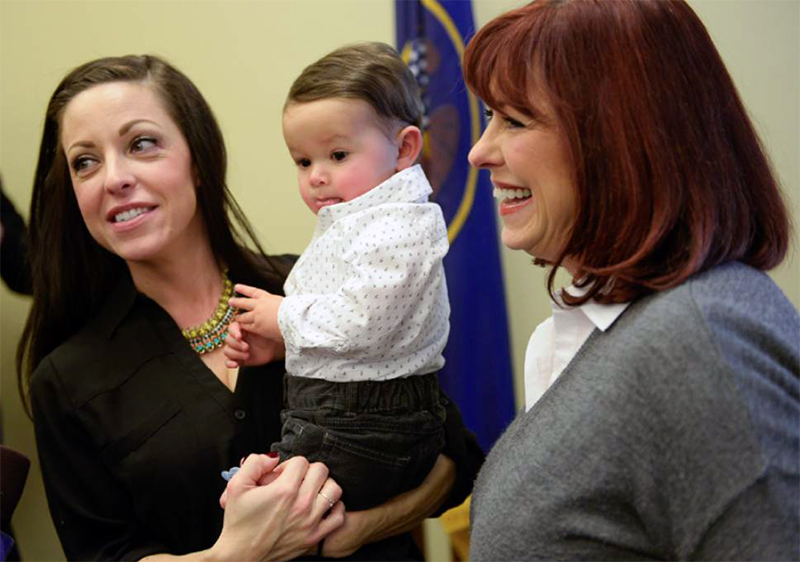You’re accessing archived content
This is archived content from the UIT website. Information may be outdated, and links may no longer function. Please contact stratcomm@it.utah.edu if you have any questions about archived content.
UIT’s Lovett inspires daughter to share recovery story

Erin Finkbiner (left), Max, Jan Lovett (right). Photo used with permission from The Salt Lake Tribune
At age 25, Erin Finkbiner’s reliance on pain pills to treat an autoimmune disease escalated into a heroin addiction.
The progression isn’t uncommon, particularly in Utah. A study released last year placed the Beehive State fifth in the nation for opioid-related deaths. Opioid abuse claimed the lives of more than 380 Utahns in 2014.
Finkbiner had a good job and owned a condo, but when she started buying drugs off the street, she couldn’t fool her mother – Jan Lovett, IT product manager in UIT’s University Support Services.
“Eighty dollars for a pain pill, that gets really expensive. … When you can buy what they call a dime bag for 10 bucks, that’s what you do. And it’s not hard to find here,” Lovett said.
Lovett grew suspicious when her daughter started having trouble with the law. After Finkbiner’s fourth arrest in a year, she spent 66 days in jail. Three weeks later, she overdosed. Paramedics saved her life by administering the drug naloxone (Narcan), an opioid-antagonist nasal spray.
Yet even then, Finkbiner didn’t seek out recovery. That happened a week later in jail, after she was rearrested, and discovered she was pregnant.
“That’s where she had her profound moment,” Lovett said. “We don’t like to call it rock bottom, because rock bottom means anything. For some people it means death, unfortunately.”
Finkbiner just turned 33. She’s two years into recovery, living with her mom. Two-year-old Max Puente is healthy and happy. Finkbiner works at Elevated Billing Solutions, which specializes in insurance communications on behalf of people in recovery.
A happy ending – but far too many lives end when naloxone isn’t present following an opioid overdose.
Lovett won’t rest until physicians reconsider prescribing pain pills to patients with a history of substance abuse, the emergency services community makes naloxone as readily available as epinephrine – used to treat acute allergic reactions – and pharmacies have it stocked. If a pharmacy doesn’t, she hand-delivers copies of legislative bills that lobby for its availability.
’ Lovett is no stranger to politics; in 2005, she made it to the second ballot, falling
25 votes short of continuing her bid to be Utah Democratic Party chair. But her naloxone
advocacy journey started when Utah legislators started to discuss the Justice Reinvestment
Initiative. The measure, which allows state inmates to complete programs like substance
abuse treatment in exchange for reduced sentences, was signed into law last October.
Lovett is no stranger to politics; in 2005, she made it to the second ballot, falling
25 votes short of continuing her bid to be Utah Democratic Party chair. But her naloxone
advocacy journey started when Utah legislators started to discuss the Justice Reinvestment
Initiative. The measure, which allows state inmates to complete programs like substance
abuse treatment in exchange for reduced sentences, was signed into law last October.
Lovett attended the first public hearing on the initiative, listened to advocacy agencies, and stood up to speak.
“I cried the whole time,” she said. “I had never told my story. … [But] my motto is, tell your story and someone’s going to tell you theirs.”
That courage to share her story helped her daughter open up, too.
“I feel that speaking out is important because it might give one person strength, encouragement, a new perspective, or I might be the one person that somebody feels they can reach out to,” Finkbiner said.
Lovett, meanwhile, is a board member of Utah Support Advocates for Recovery Awareness (USARA), facilitates its family support group meetings every Wednesday, and in her “free” time, testifies at the state capitol on issues related to naloxone and full Medicaid expansion. She's also served various roles with Equality Utah, which strives to secure equal rights and protections for lesbian, gay, bisexual, and transgender Utahns and their families.
“At home, we always tease my mom about how much she’s involved in because it takes so much of her time, and who doesn't like time to themselves? What we don’t tell her is how lucky both our family and the rest of the world are to have her,” Finkbiner said. “Growing up watching my mom walk through the things that she has and develop the strength to reach out and help others has given me the courage to put myself out there and not be ashamed of things I have gone through myself.”
“My mom is without a doubt the bravest person that I know.”
Lovett has shared her story with The Salt Lake Tribune and KSL News after Cottonwood Heights became the first police department in the state to carry (and use) naloxone. Recently, mother and daughter were interviewed by Chris McGreal, foreign correspondent for The Guardian. The British newspaper is publishing a series on heroin and opioid abuse in the U.S. starting in late May.
At the University, Lovett is president-elect of the U’s Staff Council, through which she reaches out to University leadership, campus police, even students trying to start a recovery group.
“I have so many people who contact me after they read about me, or see my posts on Facebook, people from our department [and] from across campus,” Lovett said. “Some people are dealing with a substance abuse problem themselves, or they have a loved who needs to get into recovery. So, I talk about it a lot.”
Lovett sees her job, in general and in UIT, as fixing problems. Her IT product management responsibilities require her to advocate for customers on campus, a role that extends to her advocacy for U staff.
“For me, it’s just life,” she said. “If someone needs help, I help them.”
Do you need help? If you're dealing with substance abuse problem – personally, or in response to a friend or family member – Lovett encourages you to reach out to her. The conversation will be strictly confidential.
Node 4
Our monthly newsletter includes news from UIT and other campus/ University of Utah Health IT organizations, features about UIT employees, IT governance news, and various announcements and updates.
